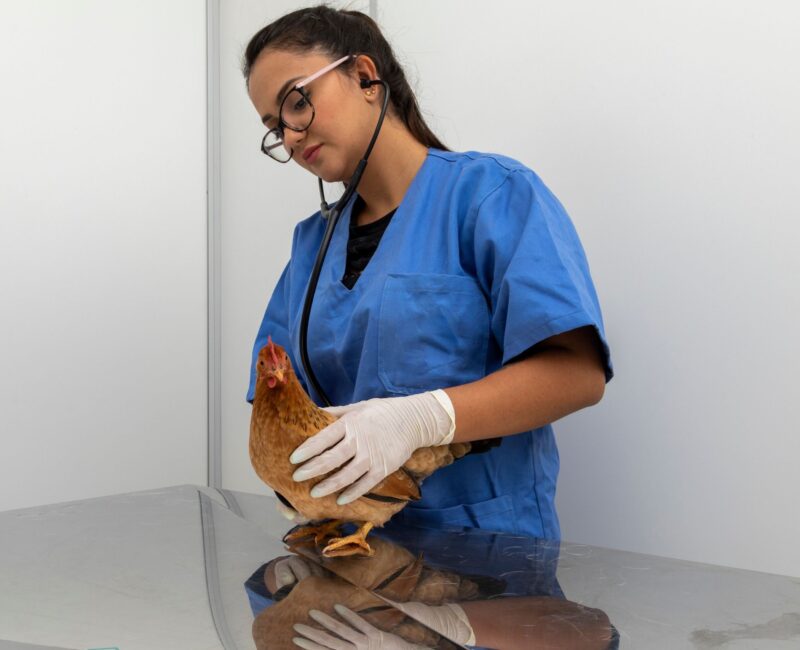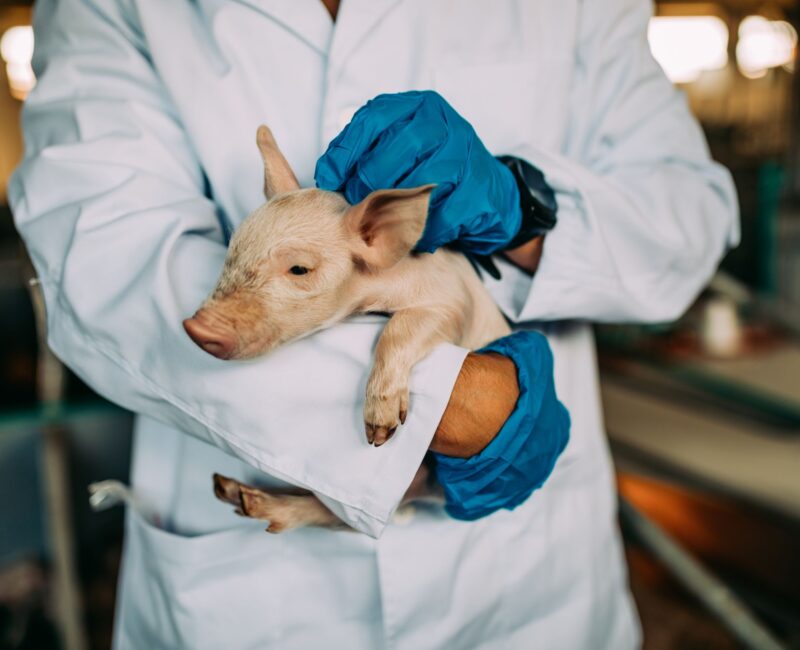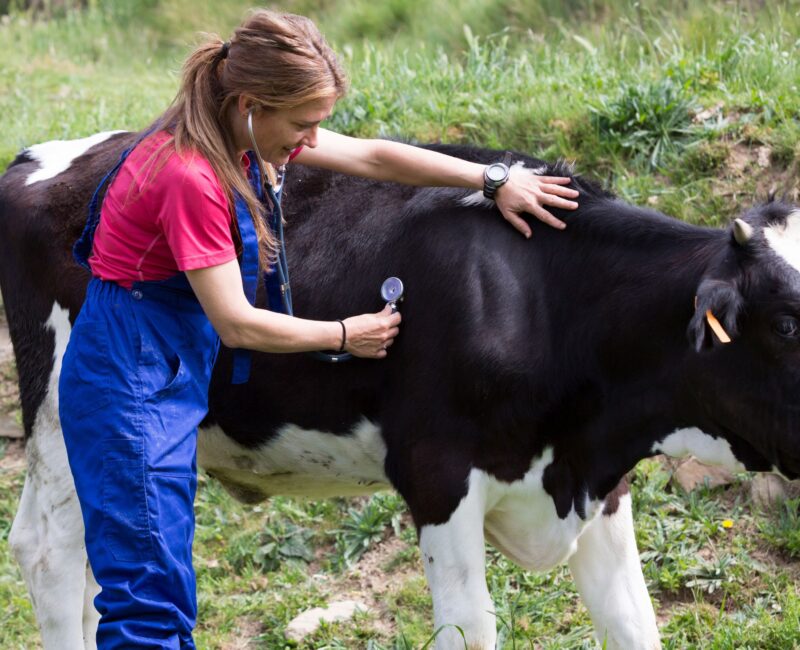Campylobacter jejuni: A Pervasive Threat in Veterinary Medicine and Public Health
Campylobacter jejuni presents a significant challenge in veterinary settings, with far-reaching implications for animal health, food safety, and public health. This highly prevalent microorganism is a leading cause of bacterial gastroenteritis in animals, particularly in livestock and companion animals. The pathogen’s ability to colonize the gastrointestinal tracts of various species without causing obvious symptoms creates a complex issue of asymptomatic carriers, facilitating silent spread within animal populations and to humans.
This bacterium’s impact on the veterinary industry and animal agriculture is substantial. In poultry, Campylobacter is especially problematic due to its high prevalence and the potential for contamination during processing, leading to significant economic losses and food safety concerns. The asymptomatic nature of many infections complicates control efforts in farm settings, as carriers can continuously shed the microbe, contaminating environments and infecting other animals.
The zoonotic potential of this pathogen amplifies its significance, bridging animal and human health concerns. Transmission to humans can occur through direct contact with infected animals, contaminated food, or water sources. This poses risks not only to pet owners and farm workers but also to veterinary professionals and anyone in close contact with animals. The public health implications are substantial, as Campylobacter jejuni is a leading cause of foodborne illness worldwide.
The microorganism’s resilience in various environmental conditions, including its ability to form biofilms, exacerbates control challenges in veterinary clinics, shelters, and farm settings. These characteristics enable the bacterium to persist on surfaces and resist standard cleaning procedures, increasing the risk of ongoing transmission.
Adding to these concerns is the growing issue of antibiotic resistance in Campylobacter strains. This trend limits treatment options and raises fears about the potential spread of resistant bacteria between animals and humans. Seasonal patterns and geographical variations in the pathogen’s prevalence further complicate veterinary management strategies, necessitating adaptable approaches to prevention and control.
The multifaceted nature of the Campylobacter problem in veterinary settings underscores the urgent need for comprehensive strategies addressing animal health, food safety, and public health concerns. As a zoonotic pathogen with significant economic and health impacts, this microorganism remains a critical focus for veterinary medicine and public health initiatives.
Common Symptoms of Campylobacter jejuni Infections in Animals:
- Diarrhea ranging from mild and watery to severe and bloody, often with mucus
- Common Symptoms of Campylobacter jejuni Infections in Animals Diarrhea ranging from mild and watery to severe and bloody, often with mucus Vomiting, either intermittent or persistent
- Fever indicating inflammatory response
- Lethargy and general malaise
- Abdominal pain demonstrated by hunched posture or discomfort
- Appetite loss leading to potential weight loss
- Dehydration resulting from fluid loss
- Weight loss, particularly in prolonged or severe cases
- Bloody stools indicating more severe intestinal inflammation
- Muscle pain in cases of systemic infections
Symptoms may vary between young and adult animals, with puppies and kittens often experiencing more severe effects. Cats typically show more subtle signs compared to dogs. Some animals, especially poultry, can be asymptomatic carriers. Symptoms usually develop within 2-5 days of infection and may persist for several days to weeks in chronic cases.
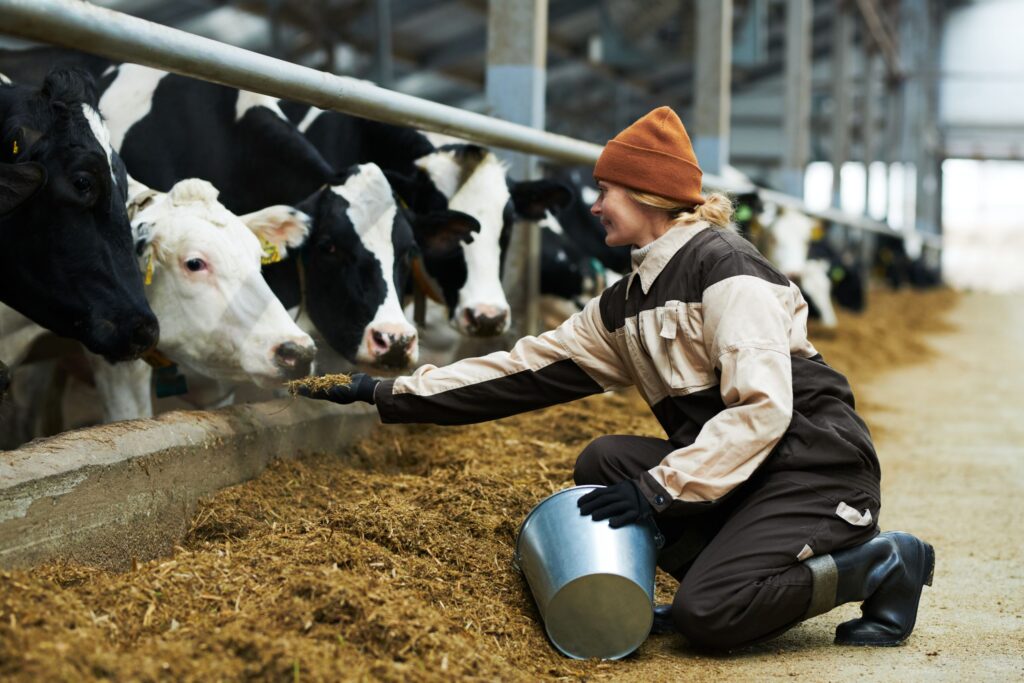
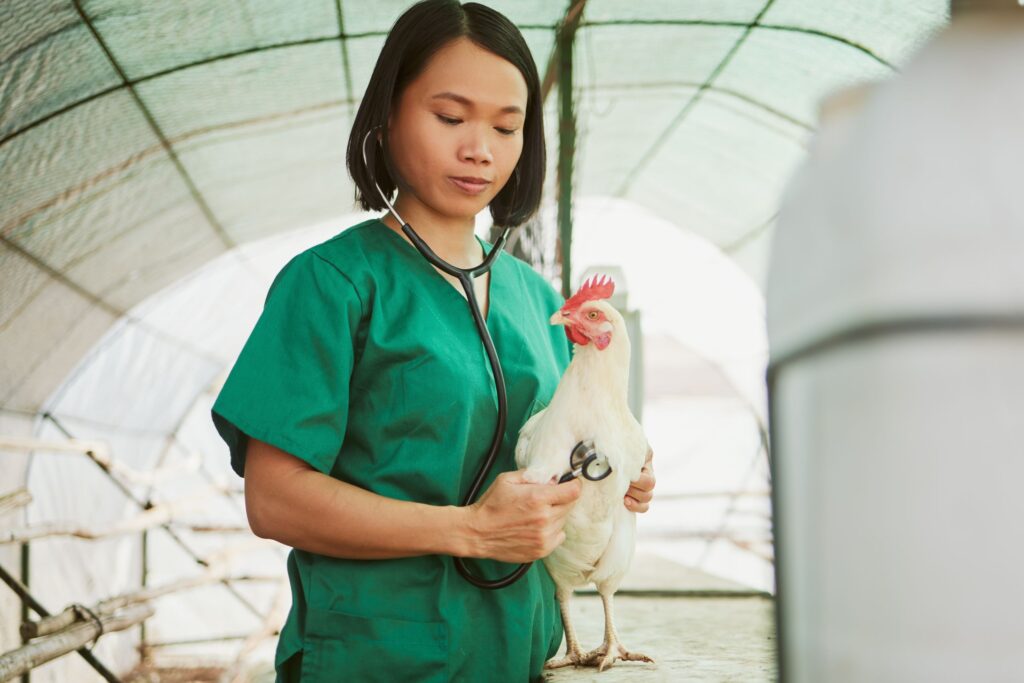
Current Challenges in Treating Veterinary Campylobacter jejuni Infections
Treating Campylobacter jejuni infections in veterinary settings presents significant challenges, primarily due to increasing antibiotic resistance and the pathogen’s resilience. The bacterium’s growing resistance to fluoroquinolones and macrolides has severely limited therapeutic options, complicating individual animal care and raising concerns about the spread of resistant strains through the food chain.
Diagnosis is often problematic due to non-specific symptoms and the need for specialized laboratory tests, which may not be readily available or cost-effective in all veterinary settings. This can lead to delayed or inappropriate treatment, potentially exacerbating the spread of the pathogen.
The bacterium’s ability to persist in the environment and in asymptomatic carriers complicates control efforts, especially in poultry farms and dairy operations. This persistence can lead to continuous cycles of infection, impacting animal health and productivity. Even after treatment, some animals may remain carriers, posing an ongoing transmission risk.
Treatment limitations extend beyond antibiotic resistance. Antibiotic use can disrupt the animal’s natural gut microbiota, potentially leading to secondary complications. In food-producing animals, adhering to withdrawal periods for antibiotics can impact treatment decisions and farm management practices.
The economic implications are substantial. Livestock producers face reduced productivity, increased veterinary costs, and potential market restrictions. In companion animal practice, the cost and complexity of treating resistant infections can strain client resources and veterinary capabilities.
These multifaceted challenges underscore the urgent need for innovative approaches to managing Campylobacter jejuni infections in veterinary medicine, balancing effective treatment with responsible antibiotic use and public health considerations.
Control C. jejuni Effectively with Targeted Phage Therapy. Discuss Your Veterinary Needs with Our Experienced Consultants.
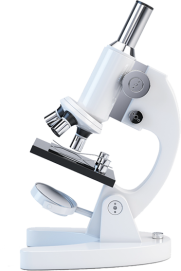

Bacteriophage Therapy: A Targeted Approach to Campylobacter Infections
Qeen Biotechnologies presents an innovative bacteriophage therapy tailored to combat Campylobacter jejuni in companion animals. Our approach harnesses viruses that specifically target this microorganism’s unique structure, addressing the distinctive characteristics of this gastrointestinal pathogen in dogs and cats.
Our therapy excels at targeting Campylobacter jejuni in the complex environment of pet intestines, where this bacterium typically causes discomfort. This is crucial for addressing both acute and chronic infections in dogs and cats, helping to alleviate symptoms and prevent recurrence of this troublesome pathogen.
The precision of our bacteriophages allows for effective treatment of Campylobacter infections without disrupting the delicate balance of the pet’s gut microbiome. This is particularly important for puppies and kittens, whose developing digestive systems are especially vulnerable to dysbiosis during treatment.
In veterinary clinics, our therapy offers a novel approach to treat Campylobacter jejuni infections in companion animals, potentially reducing the need for broad-spectrum antibiotics. For pet owners, it provides a targeted method to control this zoonotic agent, minimizing the risk of transmission between pets and their human families.
Qeen Biotechnologies’ Campylobacter-specific bacteriophage therapy gives veterinarians a powerful tool to address this common cause of pet diarrhea. It offers a targeted solution to a pathogen that has long challenged conventional treatments, opening new avenues in companion animal health management and improving the quality of life for our furry friends.
How It Works
Qeen Biotechnologies’ bacteriophage therapy for Campylobacter jejuni employs a precise, three-step biological process to combat this zoonotic pathogen in animals. This natural mechanism specifically targets C. jejuni while leaving beneficial gut bacteria unharmed.
Infection
Replication
Lysis
The self-perpetuating nature of this process allows for ongoing action against Campylobacter jejuni as long as the bacteria are present in the animal’s system. This feature is particularly valuable in veterinary medicine for managing C. jejuni infections, which can be challenging to treat with traditional antibiotics. The therapy’s ability to replicate at the infection site reduces the need for frequent readministration, making it an efficient option for both acute and chronic C. jejuni infections across various animal species, from poultry to companion animals.
By leveraging this targeted biological mechanism, Qeen Biotechnologies provides veterinarians with an advanced tool to combat Campylobacter jejuni infections. Our bacteriophage therapy offers a precise, effective, and environmentally responsible approach to managing this significant zoonotic pathogen, contributing to improved animal health and reduced risk of transmission to humans.
Qeen Biotechnologies
Benefits of Bacteriophage Therapy in Veterinary Medicine
Bacteriophage therapy offers numerous advantages for treating bacterial infections in animals, with specific benefits for Campylobacter jejuni infections:
Unlike broad-spectrum antibiotics, bacteriophages are highly specific to their bacterial targets. This precision targeting means:
- Selective elimination of harmful Pseudomonas bacteria, preserving beneficial microbes
- Minimized disruption to the body’s natural microbiome
- Reduced risk of opportunistic infections, such as Candida albicans overgrowth
Bacteriophages provide precision in bacterial control:
- Specifically targets C. jejuni strains, including antibiotic-resistant variants
- Effective against various C. jejuni subtypes found in different animal hosts
- Reduces risk of disrupting beneficial gut microbiota in treated animals
This therapy addresses the growing concern of antibiotic resistance:
- Effective against antibiotic-resistant C. jejuni strains, an increasing problem in veterinary medicine
- Reduces reliance on critical antibiotics used for treating C. jejuni infections
- Helps preserve antibiotic efficacy for both animal and human health
Bacteriophage therapy adapts to diverse veterinary needs:
- Applicable in poultry, livestock, and companion animals affected by C. jejuni
- Can be tailored for species-specific C. jejuni presentations, such as poultry enteritis or canine gastroenteritis
- Adaptable to various clinical manifestations, from subclinical infections to acute gastrointestinal disease
This approach offers ecological and financial advantages:
- Minimizes release of antibiotics used for C. jejuni into the environment
- Naturally biodegradable, supporting eco-friendly veterinary practices
- Supports sustainable and cost-efficient management of C. jejuni infections
- Potential for reduced treatment costs in commercial poultry and livestock operations
- May decrease economic losses associated with C. jejuni in food animal production
Bacteriophage therapy contributes to safer food production:
- Reduces antibiotic use in food-producing animals affected by C. jejuni
- Helps control C. jejuni contamination in poultry and other animal products
- Supports efforts to minimize foodborne C. jejuni transmission to humans
Phages can effectively target bacteria in biofilms:
- Addresses C. jejuni biofilms that may form in animal gastrointestinal tracts
- Particularly useful in treating persistent C. jejuni colonization in poultry
- Enhances treatment efficacy where antibiotics often fail against biofilm-associated C. jejuni
Bacteriophages can evolve with their bacterial targets:
- Potential for long-term efficacy against evolving C. jejuni strains
- Reduces the need for constant development of new treatments for C. jejuni
- Offers a dynamic approach to C. jejuni control in veterinary medicine
This innovative approach to treating Campylobacter jejuni infections in veterinary medicine provides a promising alternative to traditional antibiotics, addressing key challenges in animal health while supporting broader public health and food safety goals.
Regulatory Expertise for Bacteriophage Therapy
Qeen Biotechnologies offers comprehensive regulatory support for bacteriophage therapy targeting Campylobacter jejuni infections in veterinary medicine. We navigate the intricate regulatory landscape surrounding this zoonotic pathogen, ensuring compliance with veterinary standards and facilitating a smooth progression from development to clinical application in animal health.
Our regulatory services encompass all requirements for C. jejuni-specific bacteriophage treatments. This includes preparation of CMC (Chemistry, Manufacturing, and Controls) packages tailored to veterinary applications, with a focus on the unique challenges posed by C. jejuni in various animal species, particularly in poultry. We offer consultation on INAD (Investigational New Animal Drug) applications and coordinate electronic Common Technical Documents (eCTD) for compliant submissions to veterinary regulatory authorities.
Our experienced regulatory team guides clients through each stage of the process, from initial documentation to final approval for veterinary use against C. jejuni. We oversee crucial elements such as compiling regulatory dossiers, communicating with animal health regulatory bodies, and maintaining Good Manufacturing Practice (GMP) standards for veterinary products. Our services extend to regulatory advice on veterinary clinical trial protocols specific to C. jejuni infections and support during regulatory inspections of animal health facilities.
By managing these complex regulatory procedures, we enable our clients to efficiently navigate the approval process for C. jejuni bacteriophage therapies in veterinary medicine. Our expertise not only ensures regulatory compliance but also accelerates the delivery of these innovative treatments to veterinary patients, maintaining high standards of safety and efficacy in combating C. jejuni infections in animal care, with potential implications for food safety and public health.
Enhancing Food Safety with Bacteriophage Technology
Qeen Biotechnologies’ bacteriophage solutions offer an innovative approach to combat Campylobacter jejuni contamination in animal-derived food products. Our specialized phages can be applied at critical points in food processing to target this zoonotic pathogen. In poultry processing, our bacteriophages can be used as a wash or spray treatment to reduce C. jejuni on carcasses and equipment surfaces. This application helps prevent cross-contamination and significantly lowers the risk of foodborne illness associated with C. jejuni. Unlike traditional antimicrobials, our bacteriophages are highly specific to C. jejuni, preserving the natural microbiome of the food product and maintaining its quality. Qeen Biotechnologies’ expertise in phage characterization and formulation enables the development of tailored solutions for various sectors of the food industry, particularly poultry production. By integrating our bacteriophage technology into existing food safety protocols, producers can enhance consumer protection while addressing the growing concern of antibiotic-resistant C. jejuni strains in the food supply chain.
Reducing Antibiotic Use in Veterinary Campylobacter jejuni Treatment
Bacteriophage therapy offers a strategic approach to decrease antibiotic reliance in treating Campylobacter jejuni infections across veterinary settings. By providing a highly specific alternative to broad-spectrum antibiotics, phage therapy allows veterinarians to reserve critical antimicrobials for the most severe cases. This targeted approach is particularly valuable in poultry farming, where C. jejuni control is crucial for both animal health and food safety. Phages can be administered through water systems or as feed additives, providing a practical method to reduce C. jejuni loads without resorting to prophylactic antibiotic use. In companion animals, where C. jejuni can cause persistent gastrointestinal issues, phage therapy offers a repeatable treatment option that doesn’t contribute to gut dysbiosis, unlike multiple courses of antibiotics.
Adapting Phage Therapy to Specific Campylobacter jejuni Challenges
Qeen Biotechnologies specializes in creating tailored bacteriophage solutions for Campylobacter jejuni infections in veterinary applications. Our process begins with isolating and characterizing C. jejuni strains from infected animals using cutting-edge genomic techniques. This enables us to select highly effective phages against various C. jejuni strains, including those showing antibiotic resistance. Our team then develops customized phage cocktails, considering factors such as the target animal species, gastrointestinal environment, and specific C. jejuni serotypes. We leverage our biotechnology expertise to ensure the stability and efficacy of our phage therapies in the challenging conditions of the animal gut, particularly in poultry and livestock. Through comprehensive in vitro and in vivo testing, we refine each solution to address the unique challenges posed by C. jejuni in different veterinary contexts. This meticulous approach allows us to offer veterinarians precisely targeted, adaptable treatments that evolve with the changing landscape of C. jejuni infections in animal health and food safety.
Connect with Our Experts
Experiencing challenges with bacterial infections? Our team at Qeen Biotechnologies specializes in developing and producing bacteriophage-based therapies across various industries. Contact us to learn how our innovative approaches can address your specific needs.



